Kashmiri Person of the Year -2008
 |
|
|
|
Kashmiri Person of the Year -2008
|
|
|
|
We are pleased to announce that the Kashmiri Person of the Year -2008 award has been proffered upon
Prof. Amitabh Mattoo  “In recognition of his achievements in the fields of academics and international relations and for serving the people of Jammu & Kashmir dedicatedly and with result” The Kashmiri Person of the Year is selected by our Editorial Board and given to a Kashmiri in recognition of considerable achievements towards the improvement and well being of others and/or for earning a good name and favorable recognition for him/herself and the Kashmiri people. The award carries a Plaque of Honor and a Certificate. |
|
PROFILE AND WORKS OF PROF. AMITABH MATTOO
Professor Amitabh Mattoo was born in Srinagar, Kashmir on 26 June 1962. He received his early education in Burn Hall School, Srinagar. Later he studied at the Jawaharlal Nehru University, New Delhi and earned a D. Phil in International Relations from the University of Oxford, United Kingdom. He was selected for the Indian Police Service in 1988, but preferred a career in academics. He has been visiting Professor at Stanford University, USA, the University of Notre Dame and the University of Illinois at Urbana-Champaign. He has been Chairperson of the Centre for International Politics, Organization and Disarmament at Jawaharlal Nehru University. For 6 years, he was the Vice-Chancellor of the University of Jammu. He is currently a Professor of International Politics at New Delhi's Jawaharlal Nehru University and also a Member of the National Knowledge Commission, a high-level advisory group to the Prime Minister of India.
He is one of India's leading thinkers and writers on international relations. Professor Mattoo is one of the few Indian academics in the field of international relations who has actually had an impact on foreign and domestic policy. Nuclear policy, India-US relations, India-Pakistan ties and Kashmir are a few of the fields in which his contributions are well recognized. Professor Mattoo's has written books on India's nuclear policy and India-Pakistan relations as well as many articles on Kashmir. Professor Amitabh Mattoo was the Vice-Chancellor of the University of Jammu from November 2002 until early December 2008 and was the youngest person ever to hold that position. During his tenure there, the University of Jammu emerged as a centre of academic and extracurricular excellence. Mattoo’s leadership gave the University a fresh profile, with the institution entering into academic collaboration with a number of top international institutions. The quality of research and teaching improved tremendously and increasingly academicians from the University of Jammu were being called to articulate the Indian perspectives on various issues in prestigious institutions in India and abroad. As Vice-chancellor of the University of Jammu, Professor Mattoo emphasized the importance of infrastructure, ensuring that the University of Jammu today competes with the best institutions of higher education, nationally and internationally and compares most favorably with other regional universities. The emphasis on infrastructure is the outcome of his stated conviction that the creation and dissemination of knowledge in a knowledge society cannot take place in a technology and infrastructure deficient environment and that an institution devoted to knowledge creation and dissemination has to engage actively with the world outside with all tools at its disposal. Under his stewardship, one of the infrastructure projects the University completed was building the Zorawar Singh auditorium complex, which includes two auditoriums, a TV studio, a museum and an art gallery, which showcase the pluralistic heritage of the state. During his tenure, the University of Jammu took the innovative decision to cover all parts of Jammu region by establishing campuses in Bhaderwah, Kathua, Poonch with satellite campuses in Surankote, Reasi and Patnitop. The emphasis in these centers is on programs like Business Management and IT, with an aim to provide skilled manpower to Corporate India as also to ensure that world class technical education is brought to deserving students from remote parts of the state, enabling them to participate in India's growing knowledge economy. AWARDS AND MISSION Recognizing Amitabh Mattoo’s contribution to education, the President of India honoured Professor Mattoo on the occasion of the Republic Day (2008) with the Padmashree. This is the first time a Vice-chancellor in Jammu and Kashmir has been so honoured.
|
|
Interview with Shehjar
Many of us know you for your professional achievements and as the recent Vice Chancellor of Jammu University. However, not as many know that you come from a family of litterateurs and academicians or about your early influences. Please tell us about your growing up and your family. AM: Actually my family, on my father’s side were all administrators. For several generations they have held important posts in the Govt. of Jammu and Kashmir. My grandfather, the late Pt. Raghunath Mattoo was a Wazir Wazarat and Divisional Commissioner till 1953. My father Shri R.K. Mattoo was in the Indian Forest Service and held the posts of Principal Chief Conservator and Chairman J&K Pollution Control Board before his retirement in 1994. I am married to Ajita, who is in the Indian Railway Accounts Service, and we have two daughters Ishita (15) and Vandita (11). AM: I think it is most important to believe in yourself and in others who work for you. It is critical also to have a vision, and sometimes be able to think out-of-the-box. Once you have a team with you and a clear vision, you can quite easily work to achieve real change. Of course, there are detractors, and there will be hurdles. But with determination, you can achieve goals which may have seemed otherwise impossible. I think it is also important to be able to defy the status quo, and challenge the dominant discourse. AM: The most important achievement in making a change was to draw the University out of its ivory tower to engage with civil society. We began to work with several groups working for the welfare and empowerment of different rather neglected sections of society. We reached out to the communities of Gujjars and Bakarwals by providing lap-tops and solar batteries to their mobile schools. NGO’s working with senior citizens and orphans were also drawn into the University’s circle of civil society initiatives. In an effort towards women’s empowerment, special courses in Computer education and vocational training were run for women from the rural areas, to make them economically independent. The decision to start off-site campuses was driven by a belief that those on the margins of our state and society must be involved in the larger knowledge revolution happening in the country. The University also became a hub of cultural activities with renowned musicians and artists being invited to perform and display their works in Jammu. All this enriched the cultural life of the region. AM: The United States, despite its relative decline, continues to be the world’s only super power. Clearly, it will engage with different countries differently. Some are seen allies, others as partners, a few as threats and we also have countries that the US sees as potential threats. I think as far as India is concerned, there is a clear strategic convergence between New Delhi and Washington. Both are English speaking, multi-cultural democracies, seeking a stable Asia. Occasionally, there are tactical differences, as over Iran or Pakistan, but I see the development of a real strategic partnership between the world’s largest democracy and the world’s oldest one. This relationship is being cemented by the powerful Indian diaspora. AM: Every country faces choices in a complex world. India has a growing strategic relationship with the US, and also a new and friendly relationship with Israel. But India has also always fought for its autonomy of decision making, and will never become part of an American bandwagon. I think India has to ensure that its national interest is furthered even while it is not targeted for any other country’s policies. AM: The military option is the last option, but it is never off the table. Before one exercises the military option, one must follow all possible diplomatic options, including using international pressure and sanctions . |
| This is what they say
Shehjar reporter Raman Raina was on the Jammu University campus to get views regarding Professor Amitabh Mattoo’s tenure there. |
|
|
|
Transcript of Interview With Hamid Karzai |
 |
| Interview: Hamid Karzai 'Afghanistan is home for all Afghans' By Amitabh Mattoo From Kabul, Presidential Palace There are few leaders in the world that that have encountered threats to their life almost every single day of their tenure. Even in the recent past, the President of Afghanistan, Hamid Karzai, has survived at least four serious assassination attempts and scores of other plots that were hatched by all those opposed to his vision of building a 'new' Afghanistan. Not surprisingly then, gaining entry to his fortified residence in Kabul is a visitor's nightmare. Not even a pencil is allowed in, as a combination of mechanical, human and canine interceptors attempt to secure the President. Journalists are treated with exceptional suspicion after an Al Qaeda suicide squad, posing as a television crew, assassinated Ahmad Shah Massoud, described today as " the national hero of Afghanistan", two days before 9/11. The only recent change in the security infrastructure is the gradual transition from the ubiquitous US Marines in the Presidential Palace to more Afghan guards. On the streets of Kabul, the sense of a country and a city under siege is no less. Heads of missions routinely travel in bulletproof vehicles escorted by vehicles with jammers to detect IEDs, and Embassies are fortified with several sets of concrete walls to prevent suicide bombers from gaining access. That, however, did not prevent the suicide attack on the Indian embassy that killed two Indian diplomats and scores of others. But Hamid Karzai displays none of the tension and insecurity that goes with being the President of arguably one of the most difficult and insecure states in the international system. Charismatic, charming, confident and remarkably articulate in English, Karzai comes across as a leader genuinely wanting to make a difference. Although hurt by criticism over corruption in his government and by descriptions of him as being little more than the Mayor of Kabul, the President of Afghanistan seems still genuinely committed to building an Afghanistan at peace with itself and the outside world. With a remarkable understanding of Afghan history, 51-year old, Hamid Karzai, an ethnic Pashtun of the Popalzai clan of the Durrani tribe, has a great sense of pride in his people and his country. In a free-wheeling interview with Amitabh Mattoo, he outlines his vision for Afghanistan and the Afghan people. HK: Welcome Vice-Chancellor! Are there any students from Afghanistan in Jammu and Kashmir? AM: Not at the moment. But while I was growing up in Srinagar, we had many Afghan students. HK: You know, Afghanistan had a period of very bad rule in Kashmir. Have you studied that? AM: Yes, Sir! HK: Do the Kashmiris talk about it? AM: They talk about Afghan rule, in not in the most pleasant of terms. HK: They don't? Where is Zalmay Rasool? Bring him? Let us defame him. We have here my National Security Advisor, Zalmay Rasool. His great grandfather was the Afghan Governor of Kashmir. A terrible Governor. He was the last Governor of Kashmir of Afghanistan. When he went there, people came to greet him. As is the custom in this part of the world, they asked him "what can we do for you Mr. Governor or your Highness?" because he was his Highness the King's brother or cousin. So, he said, "I would like to help you by buying the wind from you", and the elders of Kashmir went out, consulted each other. They came back and said, fine. They sold him the wind and he gave them a couple of thousands or lakhs of rupees and he bought the wind. Time went by. They were reaping their crops and separating the chaff from the wheat and he came and said "the wind is mine", and then he charged them 25 percent of their annual products! Imagine. AM: I didn't know this. HK: Oh, he became the richest man in Afghanistan. This man's name was Azeem. Before him, there was Governor called Attah. Attah was a very good man. Azeem was the last Governor. So, the people of Kashmir wrote a poem in Persian to Amir Dost Mohammed Khan, the king of Afghanistan. In that poem they kind of explained to him that this is not the right kind of governor: "Attai Mohammed ma burai, Bala-i-Azeeme har ma firastane". Attah means 'gift' - they say in the poem that you have taken away the gift of Mohammed, meaning the Prophet Mohammed - from us and sent us a 'great (Azeem)' evil in its place. When the king read this, he recalled the Governor. With that also came the end of Afghan rule in Kashmir. AM: I know, it was not a pleasant time. HK: And what is your own field? AM: International Relations. I did my D.Phil from Oxford University and then I came back and taught at Jawaharlal Nehru University (JNU) for some years. HK: JNU, a great place! I like that institution a lot. India will do very well, if it continues to lay emphasis on intellectual excellence. And it must do more in the field of value education. You have embedded in the Indian culture and psyche, the depth of knowledge. And that is an immense asset in your hands in India. If you can continue to combine that, with modern science and with the humility and humbleness that Indian culture offers, that combination will make India one of the greatest countries in the world in the coming years. I am always afraid, that the new generations of India will misunderstand modernity; that they will interpret modernity as not wearing, say, a sari. The sari used here as a symbol for many things. Your depth of cultural beauty is the most important concern for humanity. Going beyond the self, is one of the greatest assets of India. What Gandhi ji has done for you, in terms of the struggle for rights and going beyond self. Sometimes I am concerned. I hope I am wrong. What is your view? Do you think the young in India know what they are doing? AM: I think it is one of the great challenges. HK: It is? AM: And what is happening is that occasionally we lose the balance, while being driven by, as you pointed out, the attractiveness of modernity. Sometimes it is so seductive that you begin to lose your moorings, your roots. HK: Attractiveness of modernity or modernity misdefined? AM: I agree, modernity misdefined. But the greatness of India, as you pointed out will be that it will, hopefully, be able to strike and sustain the right balance. HK: To sustain it will take an amount of effort. But let us hope that it happens! AM: How do you look back at your tenure as President, in terms of what you have been able to achieve and what you thought you could have possibly done better? HK: When I look back at my past six years as the President of Afghanistan, my greatest success is that I made Afghanistan home for all Afghans. All Afghans feel comfortable here, those who were fighting with each other in the streets of this country, are now sitting side by side in the Parliament, debating each other, voting for each other, making alliances, breaking alliances. The other big achievement is in the return of Afghan boys and girls to education, I wish we had invited you yesterday, we forgot, to the commencement ceremony of 600 students from all around the country, who graduated from various faculties of Universities of Afghanistan. It was a great-great day. I take pride also in the improvement in health services, of which earlier we had almost none. I also brought back to this country the voice of the people. They can talk now; they have the freedom to express themselves, freedom of expression, freedom of speech and a culture of debate in society. I have exposed the government to criticism. The government is no longer the ruler. It is a body facing serious public scrutiny. Just a few minutes before you came, there was the German press with me. They grilled me on corruption, grilled me completely, and roasted me. Good! That is what I want. I brought back to this country, the public treasure. There is financial procedure, norms, a code of conduct. There are no secret or hidden accounts. The country has gone from 180 dollars per capita to two times higher. It is nearly 355 dollars now. The legitimate GDP has doubled. Afghanistan has found its place back in the rest of the world. Its flag is flying all around the world. Its presence is all around the world. There is no venue in which Afghanistan is not present. Afghanistan has built more roads in the past 5-6 years then it has ever built in its life. Afghans spend more than they did even before. Of course, all of this is due to the help of the international community. And, most importantly, . Afghanistan was removed from being a surrogate in this part of world to this or that country. Its identity, its independence is no longer as threatened. AM: And the failures? The problems? HK: Afghanistan has lots of problems. Poppy and the opium trade, which will not go away in spite of all my efforts for another 10-15 years. We have to work together: our society and the international community to deal with this huge problem. Much of the poppy cultivation is driven by desperation. So, desperation has to go away for people to resort to legitimate forms of agriculture. Afghanistan still has a very weak capacity in administration. It doesn't have the tools, the human capital to deliver the goods to its people. And, of course, what makes most sad is the number of Afghan lives that we have lost in the form of the Taliban and in the form of those fighting against the Taliban from Afghanistan. So, the lack of complete security for the Afghan people is one of my greatest sorrows and perhaps my greatest failure. Though the country on the whole has seen a lot of stability and peace, but even one home feeling unsafe is equal to the whole country feeling unsafe. AM: Regarding India, you talked about its contribution in education. I talked to a group of Afghan students and they said that the American University may set-up a campus in Kabul. Would the Afghan Government be open to Jammu University setting up a campus in Kabul? Or a public-private partnership in education? HK: Absolutely! We want investment in education from Indian public and private players. As soon as possible, in any numbers as you like. You are already too late. Hurry up! Hurry up! This is one of the best services that you can offer the Afghan people. Also, we would encourage investment in health, in Information Technology, in infrastructure building and Agriculture. AM: In terms of the region, now that Afghanistan is a part of SAARC how do you view the process of regional integration? And what about Pakistan? You know there is concern within India about Pakistan being a spoiler. HK: Well, this is a very important issue, for Afghanistan, for Pakistan and for India. Wisdom would not lead us in any other direction but in the direction of openness and co-operation. If we continue to have blockages for transit and transport, in exchanges of trade and commerce, we are not hurting the other countries, we are hurting ourselves. So, this is not only a policy, this is a human wish for the next generations of the countries of the world, of this region, especially the three countries. If we want to live in prosperity, we have to open up, completely separating politics from it. I would very much recommend an open road system, open exchanges of goods, of industry, of talents. Eventually this is going to happen, it will be better if it happens sooner. Pakistan should give access to India to move to Central Asia. India should give full access to Pakistan to move to East Asia. India must recognize Pakistan's importance and Pakistan must recognize India's importance. Afghanistan will be happy to be engaged with both. AM: The issue of trade, as you said, should be divorced from politics but unfortunately given the history of India- Pakistan relations that's not always been so. We hope that this will change. I was in Pakistan just after the election and with the Awami National Party winning power in the North Western Frontier Province (NWFP), the new leadership is thinking of talking to the local Taliban and reviving the spirit of Pashtoonwali - the traditional cultural and social ethos and code of honour of the Pashtuns - as a way of combating extremism. You have often talked about talking to sections of Taliban? Do you think that this is possible? Will it lead anywhere? HK: Yes! First of all, the victory of ANP in the elections of North-West Frontier Provinces proved that given the opportunity, all people will vote for common sense and moderation. And the people of North-Western Frontier Province proved this in a very clear voice, by voting for a moderate, life-oriented representation. So the propaganda that the Pashtoons were extremists or harboured extremists was proven wrong by the votes that the Pashtoon cast in favour of ANP. Indeed, the Pashtoons, they were victims of extremism and terrorism. As soon as they got the opportunity, they rejected extremism and terrorism. They wanted a moderate representation, giving them hope for the future. ANP's fight against extremism is clear. They do not want to negotiate with those foreign extremists who found a place, a sanctuary, in the Pashtoon lands. They want them removed, which is good. But they want to talk to fellow Pashtoons, to their fellow men to find ways of freeing them from the grips of extremism. I would entirely support them. So, fight the extremist radicals with guns, liberate the rest. AM: Would you see this happening even in Afghanistan? HK: Afghanistan has been saying this for a long time. We want to talk and bring back to our country those who are driven out from Afghanistan by fear or consigned to bad treatment by us or by the earlier Afghan Government or the coalition. But we will not allow extremism, we will continue to fight the Al-Qaida and terrorist networks or those who are associated with them. In other words, terrorists are terrorists; they must be dealt with force by the whole world, by all of us. And those who are driven out because fear or ignorance must be given a chance to come back. AM: So, do you think the legacy of someone like Badshah Khan, the Frontier Gandhi, can be mainstreamed within the Pashtoons? HK: Immensely, immensely, his call for non-violence is a major issue today, a major issue today. And for the Pashtoons, Badshah Khan, a man like that, with a vision like that is a source of immense inspiration! At a time like today when there is so much violence inflicted upon people, so much suffering, destruction, people being driven away from homes, that vision of Badshah Khan is the best service to the cause of Pashtoons. AM: There is some concern that the Pakistani Army and the Inter-Services Intelligence (ISI) have not been acting in good faith. In other words, they have a "soft attitude" towards terrorists and extremism and that Afghanistan has also been a victim of that luke warm policy. Do you think, this would change once the democratic government in place in Islamabad finds its feet? HK: I very much hope so. I feel that there is a great realization in Pakistan that extremism is a danger to all. Pakistan itself has been suffering immensely for the last year and a half. It is for all of us to make our way through these difficulties and to emerge victorious. There is simply no other alternative and I emphasize there is simply no other alternative but to fight extremists in the region and in good faith. AM: I am sure you are aware of the catch-22 nature of the region's relationship with the United States. On the one hand, some feel that there is a genuine need for the presence and influence of the US and international community, especially here, to combat terrorism. And, yet, on the other, there seems to be growing anti-Americanism all over the region. HK: Afghanistan is, as a nation, very-very grateful to the United States of America for liberating us. We were an occupied country, almost entirely, six years ago and the United States and the rest of the world helped us liberate ourselves. Not only that, the United States came to reconstruct our country. All the comforts, all the signs of reconstruction in Afghanistan are mostly done with the help of the United States and then of course, other countries. In Afghanistan, there is no anti-Americanism, fortunately. We were grateful, even in the past, to America, because we were together fighting the Soviet army. Afghanistan's natural tendencies have always been pro- capitalism, free enterprise, and private ownership. We see the US as a God loving and God fearing country generally. I don't know why, but I have not heard of sections of India being anti-American. AM: In India to a limited extent, but in Pakistan anti-Americanism seems to be very intense HK: Yes, Pakistan. I heard a lot about it. But, I don't know whether that's true or it is only in the media, or driven by certain interests. But I can only speak for Afghanistan and I can speak only for the Afghan people. There is overwhelming support for the United States and for the United States presence in Afghanistan. And there is growing friendship between India and the United States. We encourage that, very much. AM: Just before I came to Kabul, the Indian media carried a story which said that the Afghan Government has stopped some Indian soap operas and there was some criticism in the media. HK: We have not stopped that, there was the Clergy Council of Afghanistan, the religious ulema. They had a complaint with not only Indian dramas but also Pakistani dramas and some other items in the Afghan media that they did not like from the religious point of view, not being in tone with the day to day life of people. The commission was set up to correct parts of it, not to remove it. The Afghan people love watching those dramas. AM: But this censorship is in no ways signaling a return to the days of the Taliban regime? .. HK: Not at all. Not at all. Not at all. Definitely, not, Definitely, not, Definitely, not. We were always an extremely friendly society in Afghanistan, towards India. Even when I was growing up. Among the youth here there is as much knowledge about India and Indian movies as we had when we were that age and even more. AM: Even the official photographer said that he had learnt Hindi from the films. HK: Of course, sure, they have all done that, absolutely. AM: When you were young did you see Indian movies? . HK: Of course, in our times the films were better. I don't know if I can say that. The new directors will get mad at us! AM: The expatriate Afghan writer Khalid Husseini's , A Thousand Splendid Suns was recently published. It has become very popular, but it has also raised concerns about the place and role of Afghan women. What kind of role do you see for women in Afghanistan? HK: It is an evolving and improving and developing role, but I was very happy to see so many of Afghan girls graduating recently. Almost half were girls. Almost half were girls, especially in the Medical Sciences. They are not many in Engineering, just a few of them. Most of them from Medical Sciences, a lot of them. They are growing happily. But, Afghanistan has a long way to travel, a long way to travel. We have to be realistic about it and keep trying, very-very hard. The best service for Afghan women, the best help to them to function better, is to educate them and then to educate them better. There is no shortcut, unfortunately. AM: How do you see yourself? All these years as President, are you a happier person, a most satisfied person or a more stressed person? HK: In thoughts, I am very happy. And I was very happy yesterday, in giving the Certificates and Diplomas to all the graduates, And I am happy when I have to inaugurate a road, to inaugurate a school, to see people getting education and seeing young Afghan talent emerging and to see democracy taking roots in Afghanistan, institutional structures taking roots in Afghanistan and empowerment of the judiciary, the freedom of the press. And it causes me pain, personally, I feel hurt when the press criticizes me unfairly. And of course, I have immense moments of anguish and anger when the Afghans suffer in bomb-blasts, in acts of terrorism. When our villages are bombed, our people suffer. This makes me very angry. AM: We hope that you will be elected for your next tenure. But, what would be your principle agenda for the next term ? HK: To continue to rebuild Afghanistan. In Afghanistan, the agenda is very broad. It is not like in other countries, it is not like in India, where you have certain things and you want to add other things. In Afghanistan, we have to move in all the directions, at the same time. Keep building schools, keep building roads, keep adding quantity and quality to it. In your part of the world, it is sometimes quantity. But in terms of the achievements, you keep adding to the quality that you have. In Afghanistan, we must work on fronts, quantity and quality. Better roads, more roads. More schools, better schools. More hospitals, better hospitals. More teachers, better teachers. More wages, higher wages. So, strengthening of the institutions and having ability to abide by the law, improving the rule of law and working on finishing this culture of impurity, where offenders go unpunished. AM: And combating corruption. HK: And combating corruption and combating extremism It is a very full house of activity. AM: Excellency, how do you de-stress yourself? I mean as a Vice-Chancellor, I feel stressed at the end of the day. but yours' is the most challenging job perhaps in the whole world. HK: I think for me now, the best stress buster is the sight of my son, when I go to him,. He is fourteen months old now, just beginning to learn words. Each day go to see him in the evening, he has picked up a new word. This morning he learnt 'Kela'. AM: What is his name? HK: Mirwais. Mirwais is one of the greatest Afghan personalities. He was the person who began the modern concept of loya jirga, when Afghanistan had the Iranian ruler, actually Georgian. He was from Georgia named 'Gurgan Khan' ruling in Kandhar. There began a movement of the Afghan people through consultations. What you call in your country the 'Panchayat System'. Through the Panchayat, he began a system of consultations that eventually liberated Afghanistan. Not through military means, through civilian action and consultation. A bright man! Of course, his sons created then an empire towards the west, towards Iran, right up to Isfahan and that was a short lived one. AM: Thank you very much, Excellency! HK: Welcome, Vice-Chancellor, welcome. AMITABH MATTOO - LINKS Transcript of Recent Chat with Professor Mattoo http://features.ibnlive.in.com/chat/view/223.html Books by Amitabh Mattoo https://www.alibris.com/search/books/author/Mattoo,%20Amitabh Transcript of Merinews Interview With Amitabh Mattoo http://www.merinews.com/catFull.jsp?articleID=129916 |
|
|
| Copyrights © 2007 Shehjar online and KashmirGroup.com. Any content, including but not limited to text, software, music, sound, photographs, video, graphics or other material contained may not be modified, copied, reproduced, republished, uploaded, posted, or distributed in any form or context without written permission. Terms & Conditions. The views expressed are solely the author's and not necessarily the views of Shehjar or its owners. Content and posts from such authors are provided "AS IS", with no warranties, and conferno rights. The material and information provided iare for general information only and should not, in any respect, be relied on as professional advice. Neither Shehjar.kashmirgroup.com nor kashmirgroup.com represent or endorse the accuracy or reliability of any advice, opinion, statement, or other information displayed, uploaded, or distributed through the Service by any user, information provider or any other person or entity. You acknowledge that any reliance upon any such opinion, advice, statement, memorandum, or information shall be at your sole risk. |
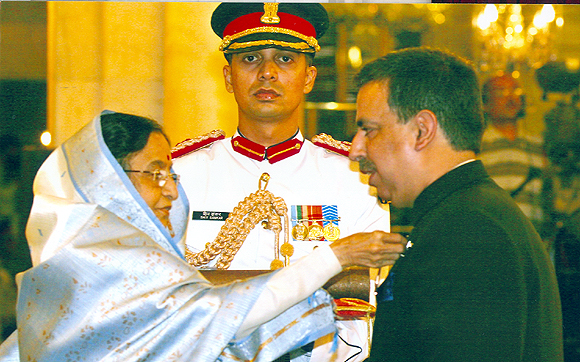
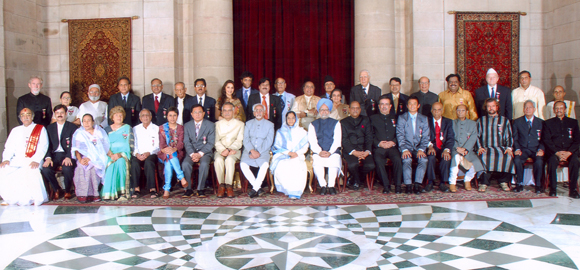
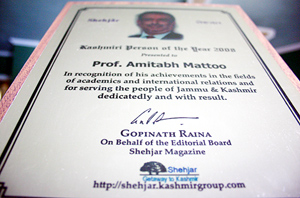
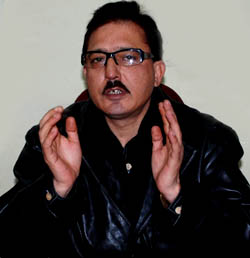 Before Prof. Mattoo joining the Jammu University, it was unknown at the national and international levels. However, soon after he took over this Institute, sea changes took place in the fields of academics, research and infrastructure, which brought international recognition to the University. Besides revision in curriculum activities, construction of an auditorium, the law school building and the bio-technology complex are some of the achievements during his tenure.
Before Prof. Mattoo joining the Jammu University, it was unknown at the national and international levels. However, soon after he took over this Institute, sea changes took place in the fields of academics, research and infrastructure, which brought international recognition to the University. Besides revision in curriculum activities, construction of an auditorium, the law school building and the bio-technology complex are some of the achievements during his tenure.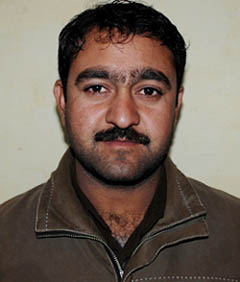 He improved the infrastructure and extended the reach of the University all over the Jammu region. He worked for students, administration and other employees and brought all of them on a single platform.
He improved the infrastructure and extended the reach of the University all over the Jammu region. He worked for students, administration and other employees and brought all of them on a single platform.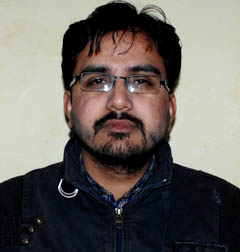 For the last 25 years research scholars were getting Rs.600 per month. M Phil scholars are now getting Rs. 2500/ and P.hd. scholars who were getting 1200 are now getting Rs. 2500 as well. In Distance education, scholars are now substituting for teachers and this also counts as job experience for them. Good facilities were provided to scholars in every department and Rs. 2 to 3 lacs was issued to the departments. Rs. 1 Crore was provided for the internet center and lab.
For the last 25 years research scholars were getting Rs.600 per month. M Phil scholars are now getting Rs. 2500/ and P.hd. scholars who were getting 1200 are now getting Rs. 2500 as well. In Distance education, scholars are now substituting for teachers and this also counts as job experience for them. Good facilities were provided to scholars in every department and Rs. 2 to 3 lacs was issued to the departments. Rs. 1 Crore was provided for the internet center and lab.